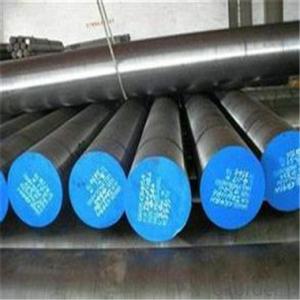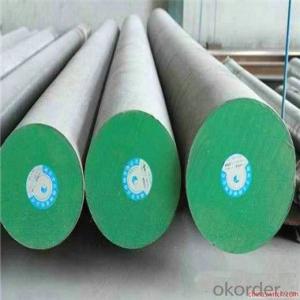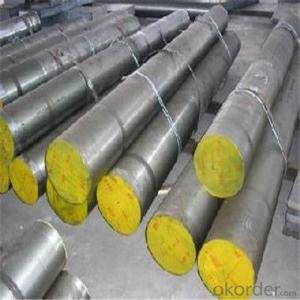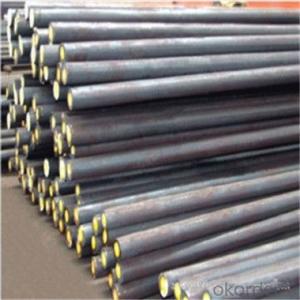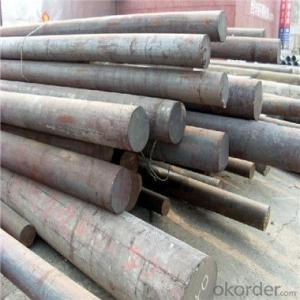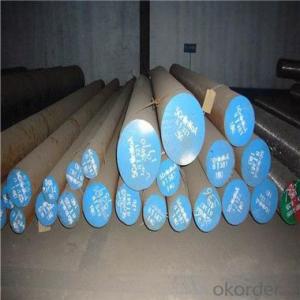C20 AISI1020 S20C S22C 1023 C22 CK22 1.0402 1.1151 Carbon Steel Bar
- Loading Port:
- China main port
- Payment Terms:
- TT OR LC
- Min Order Qty:
- 20 m.t.
- Supply Capability:
- 100000 m.t./month
OKorder Service Pledge
OKorder Financial Service
You Might Also Like
Item specifice
C20 AISI1020 S20C S22C 1023 C22 CK22 1.0402 1.1151 Carbon Steel Bar
Hardness:156HB
Tensile strength:410MPA
Yield strength: 245MPA
elogation:25% Reduction of area:55%
AKV(impact value):54J
Material: | Carbon Steel Round Bar SAE 1020 |
Diameter: | 16mm-300mm |
Length: | 3000mm-12000mm Straightness: 3mm/M max |
Process: | EAF + LF + VD + Forged + Heat Treatment (optional) |
Delivery condition: | Hot forged +Rough machined (black surface after Q/T)+ Turned (optional) |
Delivery Time: | 30days after confirmation |
MOQ: | 20 tons |
Heat treatment: | Normalized / Annealed / Quenched / tempered |
Technical Data: | According to the customer's requirement of Chemical Composition, Physical Properties and Mechanical Testing |
Marking: | Grade, heat NO. length will be stamped one each bar with required color |
Payment: | 30% advance by T\T; Balance pay before the shipment against shipping documents or irrevocable LC at sight |
Application: | Statically and dynamically stressed components for vehicles, engines and machines. For parts of larger cross-sections, crankshafts, gears. |
Test | The mill test certificate shall show the chemical composition, and itis guaranteed that the chemical composition shall be within the limitstipulated in the contract. |
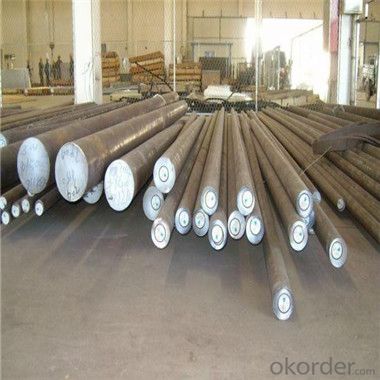
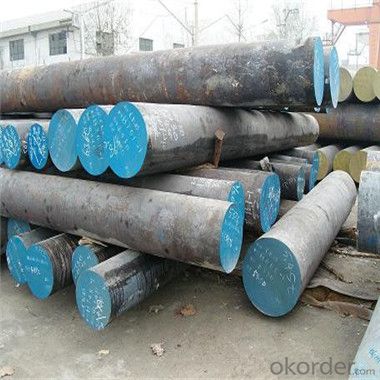
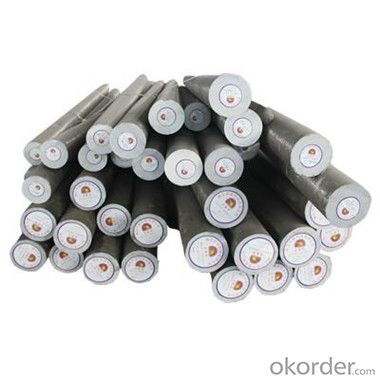
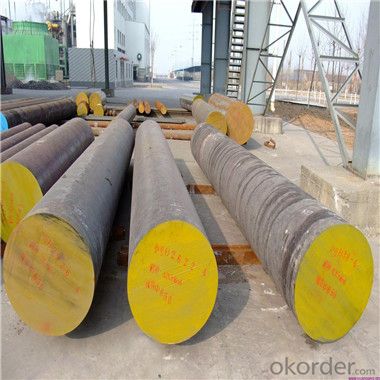
- Q:Can steel round bars be used in the power generation industry?
- Yes, steel round bars can be used in the power generation industry. Steel round bars possess high strength and durability, making them suitable for various applications within the industry, such as supporting heavy machinery, constructing power plant structures, and manufacturing turbine components. Additionally, steel's resistance to corrosion and ability to withstand extreme temperatures make it an ideal material choice for the power generation industry.
- Q:How do steel round bars compare to other types of steel products?
- Steel round bars are a versatile and widely used type of steel product that offer distinct advantages over other types of steel products. Firstly, steel round bars have a circular cross-section, which provides excellent strength and stability. This makes them ideal for applications that require load-bearing capacity, such as construction, automotive, and manufacturing industries. Compared to other types of steel products, such as steel plates or sheets, steel round bars are more easily customizable. They can be easily cut, drilled, and machined to meet specific requirements, making them highly adaptable to various applications. This flexibility allows for the creation of complex shapes and structures with precise dimensions, making steel round bars a preferred choice in engineering and fabrication projects. Furthermore, steel round bars have excellent tensile strength and durability, ensuring long-lasting performance even in demanding environments. They possess high resistance to corrosion, impact, and wear, making them suitable for outdoor or high-stress applications. This durability also contributes to the cost-effectiveness of steel round bars, as they require minimal maintenance and have a lengthy lifespan. Another advantage of steel round bars is their availability in a wide range of grades and alloys. This allows for the selection of steel round bars with specific properties, such as increased hardness, heat resistance, or enhanced machinability, depending on the intended application. The availability of various grades ensures that steel round bars can be tailored to meet specific performance requirements, making them a versatile choice for engineers and designers. In conclusion, steel round bars offer several advantages when compared to other types of steel products. Their circular cross-section provides excellent strength and stability, while their customizability allows for precise shaping and dimensioning. Steel round bars are highly durable, resistant to corrosion and wear, and available in a wide range of grades, making them suitable for a variety of applications across different industries.
- Q:What are the different types of threads used for steel round bars?
- The usage of various thread types for steel round bars depends on the specific application and requirements. The most common thread types for steel round bars are as follows: 1. Unified National Coarse (UNC) Thread: This thread type is widely utilized for general-purpose applications and offers a relatively coarse pitch. It is suitable for most common applications that do not demand high strength. 2. Unified National Fine (UNF) Thread: UNF threads have a finer pitch compared to UNC threads and provide better resistance to vibration. They are commonly employed in applications that require a higher level of thread engagement and improved thread performance. 3. Metric Thread: Metric threads are prevalent in countries that adopt the metric system. They are characterized by their pitch, which determines the distance between each thread. Metric threads offer a precise and standardized threading solution for diverse applications. 4. Acme Thread: Acme threads possess a trapezoidal shape and find frequent use in applications necessitating high strength and resistance to wear and tear. They are often employed in heavy-duty machinery like lead screws, jackscrews, and power transmission systems. 5. Buttress Thread: Buttress threads have a triangular shape, with one side perpendicular to the thread axis. This unique design enables them to bear high loads and resist axial forces in a specific direction. Buttress threads are commonly found in applications involving high-pressure fluid flow, such as hydraulic cylinders and pumps. 6. Whitworth Thread: Whitworth threads were extensively used in the past but have become less common in modern times. They have a rounded profile and a coarse pitch. Whitworth threads can still be found in older machinery and equipment. Choosing the appropriate thread type for a specific application is crucial to ensure the proper fit, functionality, and durability of the steel round bar. Factors such as load requirements, environmental conditions, compatibility with mating parts, and industry standards will determine the suitable thread type for a given situation.
- Q:Can steel round bars be used for shafts or axles?
- Indeed, shafts or axles can make use of steel round bars. In a multitude of industries, including automotive, machinery, and construction, steel round bars are frequently employed due to their robustness, longevity, and adaptability. Their selection for shafts or axles often stems from their capacity to endure substantial loads, furnish dependable support, and endure wear and tear. By virtue of being machinable and amenable to heat treatment, steel round bars can be customized to meet specific prerequisites, rendering them well-suited for deployment as shafts or axles in a wide range of applications where strength and dependability are paramount, such as vehicles, industrial apparatus, and rotating machinery.
- Q:Can steel round bars be used for making crankshafts?
- Yes, steel round bars can be used for making crankshafts. Crankshafts are important components in engines that convert the reciprocating motion of the pistons into rotational motion. Steel is a preferred material for crankshafts due to its high strength, durability, and ability to withstand the stress and load generated during engine operation. Steel round bars are often used for making crankshafts as they provide a solid and reliable foundation for the rotating assembly. The round shape of the bars allows for easy machining and shaping into the desired crankshaft design. Additionally, steel can be heat-treated to further enhance its mechanical properties, such as hardness and fatigue resistance, making it ideal for the demanding conditions and high-performance requirements of crankshafts in various engine applications.
- Q:What is the difference between common wire and high-speed wire?
- The universal wire and high speed wire are the wire rods (bars) of the rolling mechanism.High wire: refers to the use of high-speed torsion mill rolling wire rod. The rolling speed of 80-160 M / s, each weight (disc) in 1.8-2.5 tons, tolerance of high precision (up to 0.02mm), in the rolling process by adjusting the process parameters (especially in the cooling line) to ensure the different requirements for the product.
- Q:What are the different types of steel used to make round bars?
- There are several different types of steel that are commonly used to make round bars. The specific type of steel used depends on the desired properties and applications of the round bar. One common type of steel used for round bars is carbon steel. Carbon steel is known for its high strength and durability. It is often used in applications that require a strong and rigid material, such as construction, machinery, and automotive components. Another type of steel used for round bars is stainless steel. Stainless steel is known for its corrosion resistance and ability to withstand high temperatures. It is commonly used in applications that require resistance to moisture, chemicals, and heat, such as food processing equipment, medical devices, and architectural structures. Alloy steel is another type of steel used for round bars. Alloy steel is made by mixing iron with other elements, such as manganese, chromium, and nickel, to enhance its properties. It offers improved strength, hardness, and resistance to wear and tear. Alloy steel round bars are often used in applications that require high strength and toughness, such as aerospace components, automotive parts, and machinery. Tool steel is a type of steel that is specifically designed for making tools and dies. It is known for its high hardness, wear resistance, and ability to hold a sharp cutting edge. Tool steel round bars are commonly used in applications that require cutting, shaping, and forming, such as drills, punches, and molds. Overall, the choice of steel used to make round bars depends on the specific requirements of the application, including factors such as strength, corrosion resistance, heat resistance, and wear resistance.
- Q:Are steel round bars suitable for use in the mining industry?
- Yes, steel round bars are suitable for use in the mining industry. Steel round bars are known for their strength, durability, and resistance to wear and tear, making them ideal for various mining applications. They can be used in the construction of machinery, equipment, and infrastructure within mines, as well as for support structures such as mine shafts and tunnels. The high tensile strength of steel round bars allows them to withstand heavy loads and extreme conditions commonly encountered in mining operations.
- Q:What are the advantages of using molybdenum-alloy steel round bars?
- There are several advantages of using molybdenum-alloy steel round bars in various applications. Firstly, molybdenum enhances the strength and hardness of the steel, making it an ideal choice for industries that require high strength materials. The addition of molybdenum improves the resistance to deformation under heavy loads, making the round bars more durable and long-lasting. Secondly, molybdenum-alloy steel round bars have excellent heat resistance properties. This makes them suitable for applications that involve high temperatures, such as in the manufacturing of heat exchangers, boilers, and furnace components. The steel's ability to withstand extreme temperatures without losing its strength and structural integrity is a significant advantage. Another advantage is the corrosion resistance provided by molybdenum. Molybdenum-alloy steel round bars exhibit superior resistance to corrosion in various environments, including acidic and alkaline conditions. This makes them an ideal choice for applications in corrosive industries such as chemical processing, oil and gas, and marine environments. Furthermore, molybdenum-alloy steel round bars offer excellent weldability and machinability. The molybdenum content ensures that the steel maintains its structural integrity during welding and machining processes, minimizing the risk of cracks or deformations. This ease of fabrication allows for greater flexibility in design and construction. In addition to these advantages, molybdenum-alloy steel round bars also offer good wear resistance, making them suitable for applications that involve abrasive conditions. Their ability to withstand wear and tear ensures a longer service life, reducing maintenance and replacement costs. Overall, the advantages of using molybdenum-alloy steel round bars include increased strength, heat resistance, corrosion resistance, weldability, machinability, and wear resistance. These properties make them a preferred choice in various industries where durability, reliability, and performance are essential.
- Q:Are steel round bars suitable for welding?
- Yes, steel round bars are suitable for welding.
1. Manufacturer Overview |
|
|---|---|
| Location | |
| Year Established | |
| Annual Output Value | |
| Main Markets | |
| Company Certifications | |
2. Manufacturer Certificates |
|
|---|---|
| a) Certification Name | |
| Range | |
| Reference | |
| Validity Period | |
3. Manufacturer Capability |
|
|---|---|
| a)Trade Capacity | |
| Nearest Port | |
| Export Percentage | |
| No.of Employees in Trade Department | |
| Language Spoken: | |
| b)Factory Information | |
| Factory Size: | |
| No. of Production Lines | |
| Contract Manufacturing | |
| Product Price Range | |
Send your message to us
C20 AISI1020 S20C S22C 1023 C22 CK22 1.0402 1.1151 Carbon Steel Bar
- Loading Port:
- China main port
- Payment Terms:
- TT OR LC
- Min Order Qty:
- 20 m.t.
- Supply Capability:
- 100000 m.t./month
OKorder Service Pledge
OKorder Financial Service
Similar products
New products
Hot products
Related keywords
